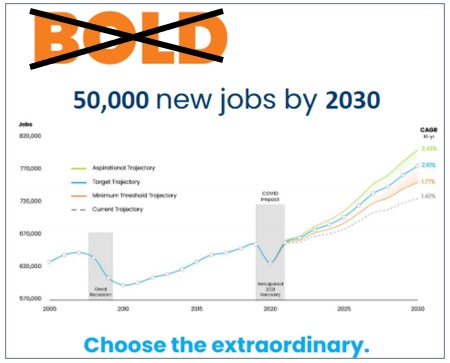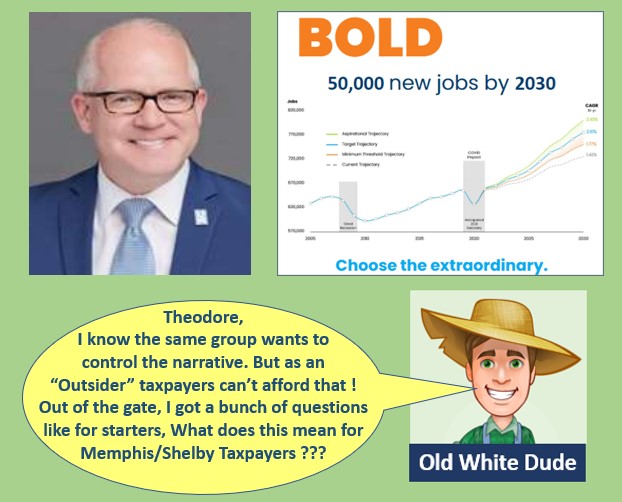Per a Daily Memphian article, Ted Townsend says, “The days of Memphis letting outsiders dictate its narrative are over. I’m here to tell you that ends today.”
As a taxpayer advocate and frequent critic of the Chamber and local public private complex, I was struct by the use of the word “outsider” in the article. Is taxpayer advocacy viewed as work of “outsider” forces ?
Probably so. After all, the local public private complex freezes up when questions arise centered around taxpayer justice. With that, questions arise after reading the first release of MemMeasures, an inaugural publication of the Chamber’s Center for Economic Competitiveness (CFEC).
After being unable to validate historic employment numbers from the Bureau of Labor and Statistics (BLS) for the chart containing the “BOLD” 50,000 job projection, these are my questions: 1) What is the Greater Memphis Region? 2) What are advanced industries? and 3) What does such a BOLD prediction mean for taxpayers?
I presume the CFEC wants folks to read the MemMeasures report, but one would not know it based on the inability to download or print the report, from the difficult to read from, issuu platform. In the interim, without clarity on some of the above, we will take a shot at concerns, per the report.
BOLD Concerns
 As far as the local narrative goes, the Chamber gang does control the narrative in the traditional media. Think about it. When is the last time you have seen press reporting or an editorial in opposition to the Chamber? Thought diversity is sorely missing from the local discourse.
As far as the local narrative goes, the Chamber gang does control the narrative in the traditional media. Think about it. When is the last time you have seen press reporting or an editorial in opposition to the Chamber? Thought diversity is sorely missing from the local discourse.
“Outsiders” has to be local public dissent coming from non-traditional channels. Regardless of the Chamber’s “Protest to Prosperity” platform, which would seem to welcome public dissent, the Chamber gang appears to want to squash credible public dissent. After all, they have never experienced such dissent. Its foreign to them and they can’t handle it. But lets’ dig deeper into MemMeasures:
Is it really BOLD ? Based on BLS research, we can assume there will be a new Greater Memphis Region. This is because the employment figures, in the above chart, do not match any of the current BLS Greater Memphis Regions, to include Shelby County or the Memphis MSA. The above chart shows employment at 620k in 2020 in the Greater Memphis Region. That is 20K+ more, than the 2020 employment for the entire Memphis MSA.
At any rate, employment growth for the Memphis MSA was 59K from 2010-19. So a 50K projection, for a yet to be defined Greater Memphis Region, is not BOLD.
What does it mean for Memphis/Shelby taxpayers? This is a question that the Chamber runs from. With the Chamber entrenched in favor of current excessive EDGE/DMC tax incentive policy, actually it will likely be more of the same for taxpayers. Currently, Shelby County represents approximately 80% of the employment of the Memphis MSA. So given the 50K Greater Memphis Region projection, 40K would be the Shelby County 10 yr projection.
Historically, 40K jobs over 10 yrs, would equate to below average percentage growth, for Shelby County, when compared to the new Chamber selected 10 member peer group. And deficient growth has also been historically compounded in a very high price for Shelby County taxpayers, with community disinvestment from excessive tax incentives, appearing to have manifested itself in lost legislative seats. So, not good for taxpayers.
Conclusion
The Chamber and the small few that control it, want to continue to control the narrative. That has historically not worked for Memphis and Shelby County taxpayers. After all, the Chamber is a business development and marketing organization and is wholly unsuited to control the narrative around public economic development.
While a reflective excerpt from MemMeasures acknowledges deficient performance, the Chamber seems to be transitioning to a regional focus. This transition has merit. But given the Chamber’s historic public economic development deficiency as a business development organization and their new regional focus, its more reason to involve new voices in Shelby County public economic development.
New voices, regularly scheduled and heard in public chambers, builds needed thought diversity and provides the vitality to support pro-business growth and real economic development. Its a bad plan to allow any chamber to hog the discourse on public economic development and even worse, if its the Greater Memphis Chamber.
In the end, taxpayer justice that serves taxpayers today, as advanced through taxpayer advocacy, is the best public economic development. This former is a departure from a Chamber public-private narrative, that serves the small few today, while using an old playbook, that overamplifies the future for a majority Black community in need…..


